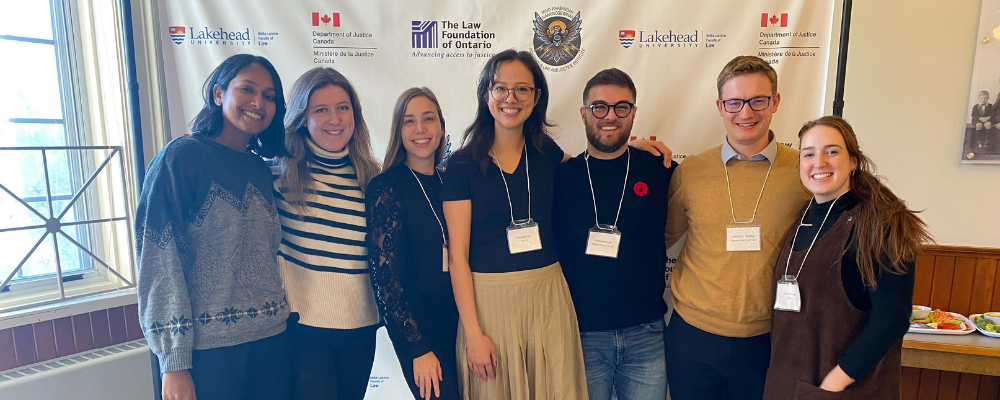Students and faculty explore the interconnectedness of food systems at seventh Canadian Association for Food Law and Policy Conference
April 02, 2024

Photo: Anthony Crudo and Jacob Van Boekel (third and second from right respectively) pose with fellow Canadian law students at the Canadian Association for Food Law and Policy Conference
Growing up on his family’s farm in Bright, Ontario seeded 3L student Jacob Van Boekel’s desire to study food law and to build a practice advising farmers and agribusinesses.
Last semester, he joined Professor Nadia Lambek and fellow students Noah Brennen (3L), Anthony Crudo (2L) and Darinka Tomic (PhD ’22) to attend the seventh Canadian Association for Food Law and Policy Conference at the Bora Laskin Faculty of Law in Thunder Bay, Ontario.
Van Boekel was selected to present his paper from Lambek’s Food Law course titled “Putting Down Roots: Assessing New Entrant Programs for Dairy and Broiler Farmers in Ontario,” which earned him the Gowling WLG - Joel Taller Prize for Emerging Voices in Food Law. Brennen and Tomic were also selected to speak at the conference, while Crudo joined Van Boekel and Lambek on the organizing committee.
“Many would-be young farmers face insurmountable financial barriers to enter agriculture. Supply management has historically been a successful means of stabilizing farmer incomes, but the cost to enter this legally constructed regime makes it even more difficult for young people to begin farming,” explained Van Boekel on the topic of his paper.
“I analyzed the present programs in Ontario that help new entrants begin supply managed farming. My main findings were that young farmers were more likely to be successful within a supply managed system, but they would benefit from reforms to help them start operating.”
While food law related to agriculture remains Van Boekel’s passion, his studies have allowed him to explore natural extensions to other areas of food law. He sees the importance of food law in both its critical relevance to food access and its high degree of interconnectivity with many areas of public and private law including trade, intellectual property, tax, human rights and animal law.
- Jacob Van Boekel
The interconnectedness of food systems and modes of governance was the central theme explored at the conference titled Recentering Food Law and Policy: Connecting People and Place. The breadth of topics covered - from the regulation of new and emerging food technologies to freshwater fishing management to the governance of food security in northern and remote communities - all illustrate the need to examine food systems from multiple vantagepoints.
Professor Lambek, a human rights lawyer, researcher and advocate focused on food system transitions and the rights of working people, and a lead organizer of the conference, presented a paper on “Contesting Agroecology at the UN Committee on World Food Security.” Her research explores how social movements interested in radically changing our food systems (to make them more equitable, sustainable, and just) engage in international law making.
“My paper documented what happened when social movements tried to get a concept called agroecology adopted into an internationally negotiated UN instrument directed at assisting states to transition towards more sustainable agricultural production models,” explained Lambek.
“Movements faced considerable opposition from states when it came to adopting mechanisms to compare and contrast between different types of production models. I documented the kinds of arguments that states used to quash movements, and why they were so successful.”
Reflecting on the key takeaways from the conference, Lambek noted that examining the governance of our food systems from different perspectives is critical.
“As scholars and practitioners, it is exceedingly important not to make assumptions about the complex food systems challenges facing different regions and peoples. As legal scholars and practitioners, we should always examine how law and policy impacts different people differently, and ensure a diversity of voices, experiences and perspectives are invited to engage in questions of food system governance,” said Lambek.
“The conference sought to foreground rural, remote, and Indigenous experiences within food system governance, and I think all participants learned a great deal from “recentering” themselves in the course of our discussions.”
From Van Boekel’s perspective, the conference was both a valuable opportunity to hear from academics and practitioners with differing viewpoints and to learn about the lived experiences of those affected by issues such as unsafe production practices and food insecurity.
“I was especially moved by hearing about the experiences of vulnerable people in the food system,” said Van Boekel. “This includes migrant workers being exposed to pesticides, food producers in the global south being sidelined by governments and big businesses alike and elderly Indigenous people in Canada struggling to get access to culturally appropriate food in hospitals and care homes.”
For Lambek, the conference was a success. She feels great pride in being able to steward the next generation’s interest in food law.
“When I left practice to become an academic, one of my dreams was to provide opportunities for students interested in food systems and food law and policy,” said Lambek. “It has been an absolute delight to work with students here at Western (as well as across Canada) and to engage them in the Canadian Association for Food Law and Policy community.”
Beyond the conference, Lambek is encouraged to see Western Law students seeking opportunities to engage in and cultivate awareness of this vital area of law both inside and outside of the classroom. With her support, Van Boekel and Crudo have established The Western Food Law and Policy Organization that now hosts food law and policy events at the law school.






